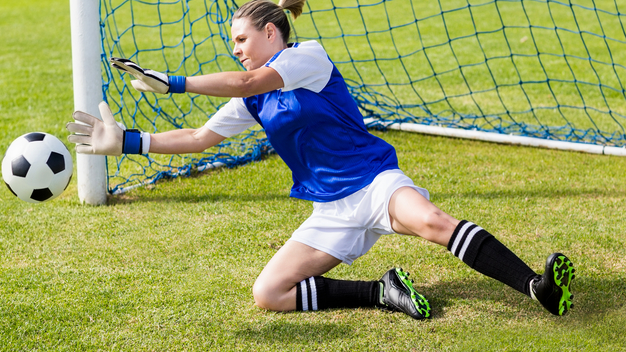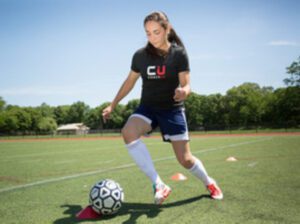When thinking about what it takes for a goalkeeper (GK) to transition from ok to good and good to great, it’s important to consider all of the skills, physical attributes, behaviors and mental skills he/she must possess.
Having spent some time thinking about this here are the five attributes I believe are essential for anyone looking to become a good GK or even excellent.
1. Size Matters
Men over 6’2″; women over 5’8″
To become good, you MUST have a presence in the goal, you must be able to reach the balls that are in the corners high and low, challenge attackers for the high balls as they come into your penalty area and get down to players feet as they race through on goal.
It’s difficult in the modern era to become a good GK if you are not at least 6′ tall in the men’s game, and honestly the majority of GKs around the world are in the 6’2″ range. At this height, it’s much easier for you to be able to deal with the high balls into the penalty area, and cover the corners of the goal as you progress through the age groups.
It’s true that through time, there have been a few exceptions. England GK, Peter Shilton, was not as tall as he should have been at 6′, and he was considered as a short GK during his time. Fabian Barthez of France won the FIFA World Cup and UEFA Euro Championships with France and was 6′ tall, too. However, perhaps the most successful GK at 6′ or below is Ika Casillas, standing at just 5’11.5″, and he has won it all:
- Five league titles with Real Madrid in Spain
- The UEFA Champions League three times, plus domestic cup, UEFA Super Cup, FIFA World Cup Club and FIFA Intercontinental Cup triumphs.
- With Spain, he dominated the world from 2008 – 2012 winning FIFA World Cup, UEFA Euro Championships twice, FIFA World Cup Club.
However, despite their dominance and success, none of these goalkeepers were ever considered to be the best in the world. These honors were given to taller goalkeepers that were considered ‘better’ because they had a presence in their goal area that provided additional confidence to the players around them.
According to a Fox Sports report in October 2016, the top 5 goalkeepers in the world are:
- Manuel Neuer (Bayern Munich & Germany) 6’4″
- David De Gea (Manchester United & Spain) 6’3″
- Thibaut Courtois (Chelsea & Belgium) 6’6″
- Petr Cech (Arsenal & Czech Republic) 6’5″
- Hugo Lloris (Tottenham & France) 6’2″
In the modern game, size matters. If you are not 6’2″ as a man, you are going to struggle to deal with the requirements of the modern game as the goalkeeper.
2. Speed of Movement
This is perhaps the single most important attribute a goalkeeper has to have and continue to develop.
A goalkeeper has to be able to cover short distances quickly in all directions–side to side, backwards, forwards, and in the direction the ball is traveling on a path towards the goal. You have to continue to develop your foot skills and quickness over 3 – 4 yards in order to make the difficult saves look easy and the impossible save possible. As a young player, there should be time set aside every practice session for this either with your dedicated goalkeeper coach or at home on your own. I personally spend a lot of time working with my goalkeepers to help them understand the importance of moving to the ball quickly and across the goal to cover the angles. You can’t be quick enough in speed of movement in and around the penalty area, and the quicker you are the easier the game will become.
3. Foot Skills
Back in the early 1990s, goalkeepers could pick up a back pass from their defenders. In 1992 FIFA changed the laws to prohibit deliberately handling a back pass. At the time, this rule change was greeted with skepticism, and in the 25 years that have passed, goalkeepers have had to become exceptionally gifted with their feet to be able to handle back passes from team mates, and in fact, are now critical parts of building up play to lead to attacks. The advent of the “sweeper keeper” has meant that it is possible to allow the goalkeeper to sit higher in the field of play when your team has the ball and defend the space behind the defenders. This means that as an attacking team, you are able to condense the play in the opponents half and make it more difficult for them to get out of the defensive position.
Goalkeepers should be integrated into the main team practices and given the opportunity to play with the other players.
If they truly wish to become exceptional, GKs will have to work on improving their left and right feet so that they can deal with the ball on either side of their body. This rule change has had the biggest impact on goalkeeper development and training in the last 25 years.
4. Training Session Quantity
In the early days of the 1980s and 1990s when I was playing soccer in England, the person that went in the goal was the slow kid or the kid that didn’t want to run…or the kid that couldn’t play. As I grew up, I had asthma so running was always difficult for me, so I was that kid. I remember many practice sessions happening where I just wasn’t doing anything–I would be standing there because the ball was on the other end of the field, and I wasn’t engaged.
Today the goalkeeper has to be the most technically gifted player on your team.
Let me say that again for those of you that are not sure what I just said. The goalkeeper is the most technically gifted player on your team. Here is why – the modern day goalkeeper has to be able to pass the ball with total accuracy, short and long, from distances of say 5 yards out to 60 yards. They must be able to deliver the ball to their team mate within playing distance across those distances and the ball MUST arrive before an opponent can close the space and win the ball. This means that the ball must be delivered in such a way that the receiver can play it first time if they need to.
How many of you can pass a ball with accuracy more than 15 yards so that the receiver can then play it first time in the direction they want to go? If you can, that is a wonderful start, can you do 20, 25, 40 or even 60 yards? David De Gea can deliver a ball off his foot to his full back–left or right–standing inside the opponent’s half with total accuracy…that is how good he has become.
You have to constantly work on your goalkeeper skills–ball handling, catching, punching, diving, gathering and deflecting. You need to improve your communication all of the time with your teammates to give the clear, precise information quickly. You have to be working on your concentration skills–there will be times in the game where you will not be involved, how do you stay involved? You have to work on being fitter than anyone else on the field. You have to cover the ground as quickly as an Olympic sprinter in the body of an NFL wide receiver. You have to be able to leap and “fly” through the air. You have to be prepared to put your body in where the cleats, knees, elbows and heads are all flying around…and still keep focused on the ball and make the catch or save. If you are not working 30 minutes before practice and 30 minutes after practice, change your regime. Get to practice early and stay late–you have to do more work than a field player because you have more techniques that need to be perfected.
In the modern game, goal scorers are usually the most expensive players. Neymar, for instance, cost Paris St Germain 220 million euros to buy from Barcelona ,and he will score 50 goals this season for them most likely. How many goals does a very good (world-class) goalkeeper save? In the same transfer window, Manchester City signed a goalkeeper from Benfica named Ederson…they spent 40 million euros on signing a goalkeeper regarded as one of the best in Europe and certainly the best that was available to buy. That is more than 5x less than what PSG paid for Neymar. I believe that Ederson will have every bit as much of an impact on Manchester City’s season as Neymar does for PSG. The difference is that Neymar will get all the headlines because goals win matches, games, championships and trophies, saves just stop you from losing.
Remember: train more and work harder at your game than anyone else on your team, and it is imperative that you have a goalkeeper coach to with you individually, in addition to your team practices.
5. Possess No Memory (Good or Bad)
This is the hardest skill for any young goalkeeper to learn, but it is the skill that will make or break you as a goalkeeper.
We sometimes refer to this as mental toughness or short-term memory loss. This is where nothing that happens, good or bad, affects you. Yes, I did say good or bad.
I was watching a young goalkeeper playing for Benfica play recently against Manchester United at Old Trafford in the Champions League group stages. He was brilliant in saving a penalty in the first half, and he was rightfully delighted with his save, since it kept the score in the game at 0-0. The ball went out for a corner, and he was working hard to get his teammates to react to the corner. He knew that the game wasn’t over, there was a corner to defend but instead of getting set to defend the corner, his teammates were celebrating the save. What they should have been doing is getting into position to properly defend the corner kick.
Later in the half, Namanja Matic of Manchester United took a shot from outside the penalty area that strikes the foot of the post, comes back into play and hits the young goalkeeper on the back and goes into the net. His reaction was EXACTLY what you want from a young goalkeeper, in both of these instances–nothing. He simply and efficiently collected the ball from the goal and sent it back to the half way line. There was no jumping around or verbal commentary to himself, he just got on with the game. I have saved the Youtube clip of the game highlights so that you can see what I saw.
https://www.youtube.com/watch?v=5gRL5OObiOI
https://www.youtube.com/watch?v=db7VEUjrMvA
Now if you watch the goal that is scored off his back, you will notice that he is slow to get across to the post, and as a consequence, as the ball comes back off the post, he is just arriving and hasn’t covered a sufficient amount of ground to get his body out of the path of the ball as it strikes the post. Had he been quicker getting there, he could have gotten even the slightest of touches with his glove for it to go away from the goal. This is why speed across the goal area is so critical.
This goalkeeper is 18 years old. He has a long way to go in the game before he reaches his maturity and has the experience and understanding of the game to become great. However, I believe with this mental toughness and approach to the game, he has every chance of one day being one of the best goalkeepers in the world. Remember the name Mile Svilar.
CoachUp is the safest and easiest way to find a coach for personalized training. With our 100% money-back guarantee and vetted coaches, anyone can achieve their full athletic potential. Find your perfect coach today and become the athlete you want to be!
How useful was this post?
Click on a star to rate it!
Average rating 5 / 5. Vote count: 1
No votes so far! Be the first to rate this post.




